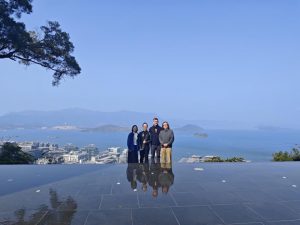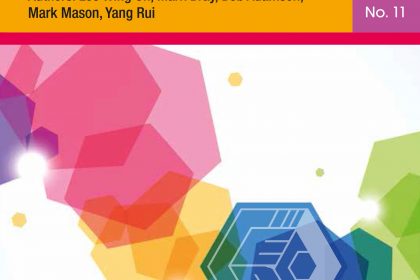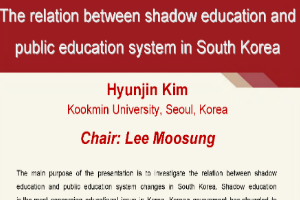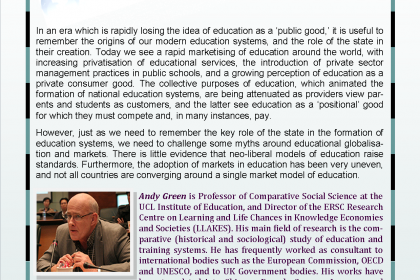One of CERC’s newest special interest groups (SIG) is the Comparative Studies in Educational Traditions (convened by Professor Lili Yang). This SIG seeks to draw on the wisdom of different traditions (onto-epistemic, cultural, educational) and to critically examine what, if anything, these traditions might offer in helping to address issues in contemporary society and education. In doing so, the SIG resuscitates a long-standing strand of research within HKU and CERC focused on dialogue, difference, and development of new paradigms for education (Manzon, 2015), as found in works such as Knowledge Across Cultures: A Contribution to Dialogue Among Civilizations (Hayhoe & Pan, 2000) and The Chinese Learner (Watkins and Biggs, 1996). It also responds to growing critiques that fields such as comparative education, educational philosophy, and higher education tend to exclude/overlook traditions beyond former Latin Christendom (‘The West’) (Jackson & Kwak, 2025, L.Yang & Tian, 2022; R.Yang, 2019)
One of the longest-standing and perennially influential traditions in East Asia is Confucianism. Since the mid-20th century, Hong Kong has been one of the key centers where the development of modern Confucianism has taken place (around names like Tang Junyi (唐君毅) and Qian Mu (錢穆) of CUHK, Mou Zongsan (牟宗三) of HKU/CUHK, and many others). Thus, as a first step in the larger project, members of the Traditions SIG initiated a Reading Group to better understand the Confucian legacy, its modern interpretation, and the outlines of the international and domestic dialogue(s) to date. The Traditions Reading Group has held 6 sessions since last November. For CERC members unable to join but interested in these new directions, below we provide a more detailed summary of the activities and conclusions of the dialogues within the Reading Group:
- On November 27th2024, we read and discussed a paper by a Mainland Confucian scholar, Chen Yun (2019). In this paper, Chen pointed out some potential limitations of Hong Kong/Taiwan modern Confucianism, and attempted to overcome these by applying Confucianism more in the political/institutional space. Although this paper was insightful in many ways, some members of the Reading Group expressed serious concern as to whether institutional (institutionalized) Confucianism is legitimate and favorable. Therefore, in order to have a deeper understanding of Confucianism as philosophy and analyze the implications for contemporary society more thoroughly, the group collectively decided to trace the historical transformation of modern Confucianism.
- On February 5th2025, the group read A Manifesto for a Re-appraisal of Sinology and Reconstruction of Chinese Culture by Mou Zongsan (牟宗三), Tang Junyi (唐君毅), Xu Fuguan (徐復觀) and Zhang Junmai (張君勱) (1958). The Chinese title is: 為中國文化敬告世界人士宣言:我們對中國學術研究及中國文化與世界文化前途之共同認識. Whenever possible, the group reads a work in both Chinese and English versions, to pick up nuances and translation issues. In clarifying the academic stance of leading Confucian scholars at that time, the Manifesto is of great historical significance in the development of contemporary Confucianism. Its authors, major representatives of contemporary New Confucianism, pointed out that the direction of Chinese cultural and intellectual studies should be to develop universal values of democracy and science from within their own traditions, and at the same time contribute to world civilization with Confucian moral philosop The Group felt that although the Manifesto certainly had historical limitations, such as uncritical acceptance of purportedly ‘universal values’ originating in Western Europe, the stance of the Manifesto still provides us valuable insights of how to approach traditional cultures and thoughts in a globalized world society. Most of all, the Manifesto underscores how HK has long been at the center of the dialogue/harmonization of Western modernity and Chinese tradition, and reveals how earlier generations of HK-based scholars attempted to contribute constructively to the global dialogue around philosophy, culture, education and so on.
- On February 13th2025, the Reading Group read a recent paper by Ni Peimin (2021), which focused on re-examining core claims of the Manifesto after 60 years of its publication. Ni elaborated on “Xin-Xing zhi xue” (the study of heart-mind and human nature, 心性之學), which the authors of the Manifesto described as the roots of Chinese thought, by tracing the historical transformation of these. Ni further examined the contemporary discussions and debates on connotations of “Xin-Xing”, and then went on to claim that the Confucian account of “human nature” should not be understood as descriptive but instead should be viewed as prescriptive. Therefore, instead of a metaphysical account of what is human, Confucian philosophy of “Xin-Xing” is at the same time a philosophy of “Gongfu” (功夫/工夫), that is what should human be and how to become such humans.
- On February 17th2025, some members of the group went on a field trip to New Asia College at the Chinese University of Hong Kong to meet Prof. Chung-yi, Cheng (鄭宗義). New Asia College historically has deep connections with contemporary New Confucianism, as two of its founders, Qian Mu (錢穆) and Tang Junyi (唐君毅), are leading representatives of this tradition. In visiting New Asia College, Prof. Cheng, who is a director successor of this line of contemporary New Confucianism and a leading global scholar of Confucianism, taught us about the history and recent development of contemporary New Confucianism. He also provided us with deep insights and rich inspirations of how Confucianism can contribute to educational studies in contemporary society. We felt very honored and grateful to have this opportunity to directly learn from the leading scholar in Confucianism studies and once again realized the potential to (re)connect education with the rich philosophical tradition in Hong Kong. Prof. Chung-yi is part of Professor Jackson’s major project (together with Prof. Duck-Joo Kwak) on educational philosophy beyond the Western world, and came to HKU in November 2024 as part of the collective work on Professor Jackson’s project. In this way, CERC activities are now synergizing with the work of leading scholars in the Department.
Picture of Prof. Cheng with members of the reading group at CUHK. The location is New Asia College’s Pavilion of Harmony. In Chinese, the name is He Yi Ting合一亭, which also makes possible the translation of the Pavilion of Unity. It was designed based on Qian Mu’s Neo-Confucian inspired ideal of “The Union of Man and Nature”, and carries forth the idea of the interconnection between Heaven and Humanity.
- Following Ni’s paper, on March 19th, we further read Peng Guoxiang’s (2015)chapter to explore Neo-Confucian (Zhu Xi 朱熹) ideas of Confucianism as practical philosophy. Peng focused on Zhu Xi’s method of reading Confucian classics and suggested that in Confucianism, reading is more than mere obtaining of knowledge, it is also about contemplating on and acting according to the words of sages and pursuing morally self-perfection through this practice. Interestingly, Chung-yi Cheng had written a similar piece around the same time that was highly resonant with Peng Guoxiang’s account, helping the Reading Group clarify how to navigate the tension between modern and tradition in the act of reading itself. Some members pointed out that Zhu Xi’s method of deep reading can be pedagogically beneficial as a countermeasure against the tendency of standardization and datafication in education. However, it is also important to rethink what should be the aims and the contents of deep reading in the contemporary world.
- As the Reading Group had encountered several times in previous readings the claim that Confucianism is not primarily a metaphysics concerning what is, but instead an ethical and practical philosophy concerning what ought to be, on April 17th, we decided to read a chapter by Meng Peiyuan (2015) discussing how is and ought were united in Zhu Xi. Through analyzing the usage of the concept of Li (理) in Zhu Xi’s writings, Meng claimed that the Is and the Ought were united in this concept because Li at the same time represents the myriad creations of nature and the purposiveness towards the good. Although we found Meng’s analysis helpful in understanding Zhu Xi’s philosophy, we also admitted that further elaboration would be necessary if we want to let Confucianism inform the decision-making process in contemporary society.
As detailed here, many deep discussions and inter-connections have been generated from this monthly Reading Group. Not only has the group provided its members with precious opportunities of reading and learning about one tradition (Confucianism), but it has also served as a platform to discuss the necessity, the limitations and the approaches of resuscitating traditional thoughts in contemporary society and education. Moreover, each session serves as actual practice in developing a bi/multi-cultural mindset (Shen & Yang, 2025) and becoming aware of our own inherent assumptions and embodied cultural resources (Zhu, Shen, & Yang, 2024). These are foundational dispositions necessary for bridging traditions. As such, the activities in the Reading Group align with and extend the vision of the Traditions SIG, namely that: in a time of multiple crises, it is necessary to restore connection with philosophical traditions in order to imagine a different future beyond the horizon of Western modernity. The SIG and this reading group will continue to pursue this vision through our ongoing activities.
References
Chen, Y. (2018). The Mainland Confucian Revival and Its Problems as Seen from the Perspective of “Civilizational Theory.” Contemporary Chinese Thought, 49(2), 139–150. https://doi.org/10.1080/10971467.2018.1496655
Mou, Z., Tang, J., Xu, F. & Zhang, J. (1958) A Manifesto for a Re-Appraisal of Sinology and Reconstruction of Chinese Culture. in Chang, C. (Eds.) The Development of Neo-Confucian Thought, vol. 2 (pp.456-483) New York: Bookman Associates.
Ni, P. (2021). Theories of the heart-mind and human nature in the context of globalization of Confucianism today. Dao, 20(1), 25–47. https://doi.org/10.1007/s11712-020-09760-x
Peng, G. (2015). Spiritual and Bodily Exercise: The Religious Significance of Zhu Xi’s Reading Methods. In Returning to Zhu Xi: Emerging Patterns within the Supreme Polarity (pp. 325–342). State University of New York Press.
Meng, P. (2015). How to unite is and ought: An explanation regarding the work of master Zhu (Colwell, E., & He, J., Trans.). In Jones, D., & He, J. (Eds.), Returning to Zhu Xi: Emerging patterns within the supreme polarity ( pp. 273-297). State University of New York Press.
















